


In this page; Program Deatil, APCD Profile, Seminar's Report, Photos from seminar
Date: Sunday, Ocotber 18, 2009,
Time: 03:00pm to 06:00pm
Venue: PIQC Conference Room, Karachi
| time | description |
|---|---|
| 03:00 - 00:10 | Recitation from the Holy Quran (Ms.Farhana Arshan - Hard of Hearing Girl) |
| 03:10 - 04:00 | Introduction of APCD and what is SbKM (Mr. Ryuhei Sano - JICA expert at APCD) |
| 04:00 - 04:15 | Documentary of STEP - An SbKM project of STEP and APCD |
| 04:15 - 05:15 | Workshop acitvity on SbKM by students and teacher |
| 05:15 - 05:30 | Presentation from workshop activity by participants |
| 05:30 - 05:45 | Danishkadah Introduction (Mr. Muhammad Akram) |
| 05:45 - 50:00 | Speech by guests (Mr. Imranulla Shariff) |
| 05:50 - 06:00 | Vote of thanks (Mr. Ghulam Nabi Nizamani) |
 APCD: The "Asia-Pacific Development Center on Disability" (APCD) Project is a technical cooperation project between the Government of Japan and the Government of Thailand, which is started in Bangkok on 1 August 2002.
APCD: The "Asia-Pacific Development Center on Disability" (APCD) Project is a technical cooperation project between the Government of Japan and the Government of Thailand, which is started in Bangkok on 1 August 2002.
The Overall goal of the project is to promote the empowerment of people with disabilities and a barrier-free society in developing countries in the Asia and Pacific Region
For further detail visit APCD website at www.apcdproject.org
In technical collaboration with Asia Pacific Development Center on Disability (APCD) a workshop on Story-based Knowledge Management (SbKM) was held under the auspices of Danishkadah on Sunday 18th October 2009 at the PIQC conference hall. The workshop was conducted by Mr. Ryuhei Sano the JICA expert at Asia Pacific Development Center on Disability (APCD), with assistance of Ms. Siripen Areenukul, an APCD staff.
It was well attended by teachers and students representing different schools for the deaf in Karachi as well as other guests.
In his presentation Mr Sano said it is widely accepted that there are two classes of knowledge: explicit and tacit. Explicit knowledge is that which an individual can express or represent relatively effectively. Explicit knowledge is information that can be described and written down, for example, in books and reports.
Tacit knowledge (as opposed to formal or explicit knowledge) is knowledge that is difficult to be transferred to another person by means of writing down or verbalizing it. For example, stating to someone that Karachi is in Pakistan is a piece of explicit knowledge that can be written down, transmitted, and understood by a recipient. However the ability to use algebra, speak a language, or design and use complex equipment requires all sorts of knowledge that is not always known.
Tacit knowledge is not easily shared. Tacit knowledge consists often of habits and culture that we do not recognize in ourselves. In the field of knowledge management, the concept of tacit knowledge refers to a knowledge which is only known by an individual and that is difficult to communicate to the rest of an organization. Knowledge that is easy to communicate is called explicit knowledge.
One example of tacit knowledge is the notion of language itself-it is not possible to learn a language by being taught the rules of grammar-a native speaker picks it up entirely unaware of the formal grammar which he may be taught later. Another example is how to ride a bike; this can only be learned through personal experimentation.
Knowledge can be shared through the SECI (Socialization, Externalization, Combination, Internalization) model, one of the most widely cited theory in knowledge management, to present the spiraling knowledge processes of interaction between explicit knowledge and tacit knowledge
It is assumed that persons with disabilities have tacit knowledge according to their unique experience. Most important is the interaction between the two types of information which can create "new knowledge". So we need Knowledge Management (KM) skills which includes Story-based Knowledge Management (SbKM). A good story combines the explicit with the tacit, the information with the emotion.
Statistical data and written documents cannot fully capture knowledge and experiences of persons with disabilities, therefore, other medias such as video, illustration and picture-story show, will be utilized. "Story-based Knowledge Management (SbKM)", is one approach to document good practices in the form of stories.
Stories are a very powerful way to represent complex, multi-dimensional concepts. While a certain amount of knowledge can be reflected as information, stories hold the key to unlocking the vital knowledge which remains beyond the reach of easily codified information. It is for this reason that APCDF is collecting two stories from Pakistan that will be presented via book form as well as DVD.
After Mr Sano's interesting presentation an activity was held in which the participants were divided into groups and each had to present an issue concerning PWDs in SbKM format.
Very thought provoking issues were presented through effective cartoon drawings.
Next, Mr Akram gave a presentation of Danishkadah to enlighten the guests about its role and activities. He said that we always try to share our knowledge gained from our national and international associates. We are willing to empower our peers with knowledge. And we thank you to APCD for their continuous support in training and networking.
Mr Ghulam Nabi Nizamani gave the vote of thanks. He expressed Danishkada's deepest gratitude to APCD for its support and Mr. Imranulla Shariff, Director PICQ for facilitating the workshop. He thanked the participants and Mr Aqeel the sign language interpreter.
Reported by
Mrs. Rukhsana Ahsan
Member Advisory board
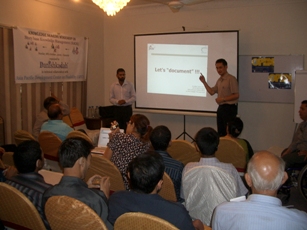
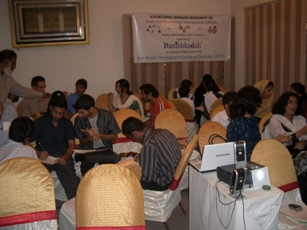
1. Mr. Sano leading the workshop on SbKM, 2. Participants busy in activities
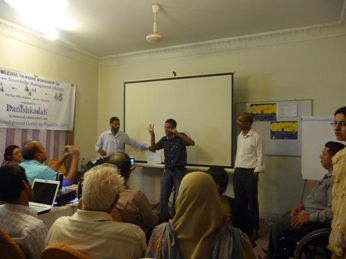
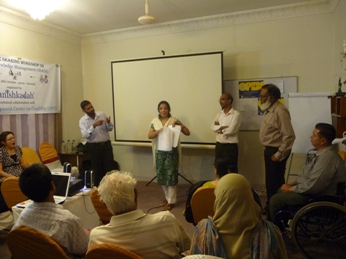
3. Student from Dewa School with their grou story 4. Teacher from Idarieu School presenting their story
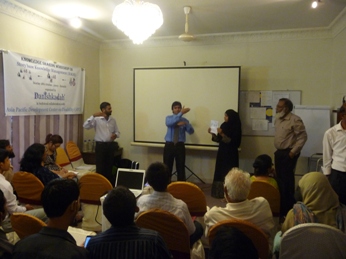
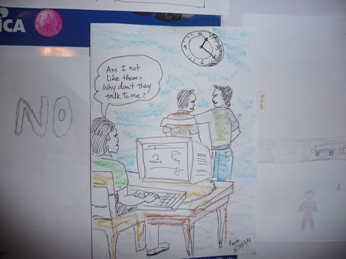
5. Two Deaf member of Danishkadah presenting their group work. 6. An Image from picture story by participants

